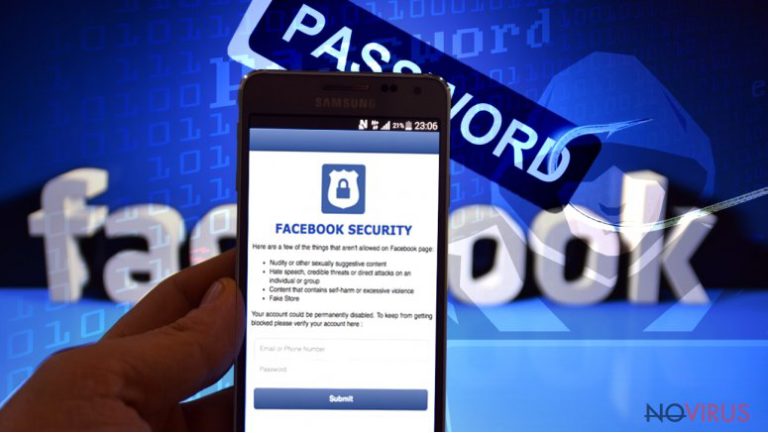Hackers found new ways to steal your Facebook account
The world’s biggest social media network Facebook[1] looks attractive not only for regular Internet users who love sharing their daily life online and business companies that use it as a communication tool with the customers. Cyber criminals find many ways how to use it for their own good as well. One of the latest threats that are spreading on Facebook is fraudulent messages claiming about unpublished pages or accounts. This activity is known as ‘Your page will be unpublished’ scam[2]. Users receive a message claiming that their accounts have been unpublished or suspended due to the reports about using fake name or picture, sharing illegal or inappropriate content, etc. However, people can save their accounts if they confirm their details.

For spreading the fraudulent message, cyber criminals have created several fake accounts such as Team Advert, Ads-Info., and Ads Department Social where they repost content from various companies, organizations or regular users. They also use Facebook’s logo, descriptions and other information that makes those profiles look legitimate. In the message hackers also provide a link to the bogus support page where victims have to reveal their phone number, email address, and password. Once people provide this information, scammers get access to the victims’ account. Since then, they can do anything: use users’ personal information for their good, start sending messages to their friends and ask to lend some money, hack their Facebook pages and use them for spreading the virus further.
It’s not the first cyber criminals’ attempt to do illegal activities on Facebook. Earlier we have analysed various versions of the Facebook virus and recently appeared news that Locky virus has stepped in and started spreading via instant messages[3]. Fortunately, users can avoid these computer infections as well as ‘Your page will be unpublished’ virus. It’s not hard to avoid viruses when you know their features.
When you receive the message saying that your ‘Your page will be unpublished’ or ‘Your page will soon disabled,’ make sure that it has been actually sent from Facebook. If you click on the provided link and end up on one of these sites page-support-uk.clan.su/security-confirm.html, support-recoverpage-info.esy.es/reconfirm.htm or wk-setting-page.hol.es, DO NOT provide any of your personal details. Even though these sites look identical to Facebook, they are not real. Nowadays cyber criminals became excellent at phishing[4], so you should be extremely careful and critical.
Sadly, all people can make mistakes and might get involved in this scam. If you became a victim of ‘Your page will be unpublished’ scam, you should immediately report this accident to the Facebook’s administration. You should not only report about compromised account[5] but also about fraudulent pages. They respond to these alerts quite quickly and remove misleading pages from Facebook. After the attack, you should change not only your Facebook’s password but other social networks’ passwords as well. You can never be sure what hackers might have done and what information accessed.
- ^ Most famous social network sites worldwide as of September 2016, ranked by number of active users (in millions). Statista. The Statistics Portal.
- ^ Olivia Morelli. “Your page will be unpublished" Facebook virus. 2-spyware. Website about malware and virus removal tips.
- ^ Locky ransomware goes on Facebook: malware started spreading via instant messages. Esolutions.lt The blog about latest virus infections.
- ^ Phishing. Wikipedia. Laisvoji enciklopedija internete.
- ^ Report Compromised Account. Facebook. Socialinis tinklas.

